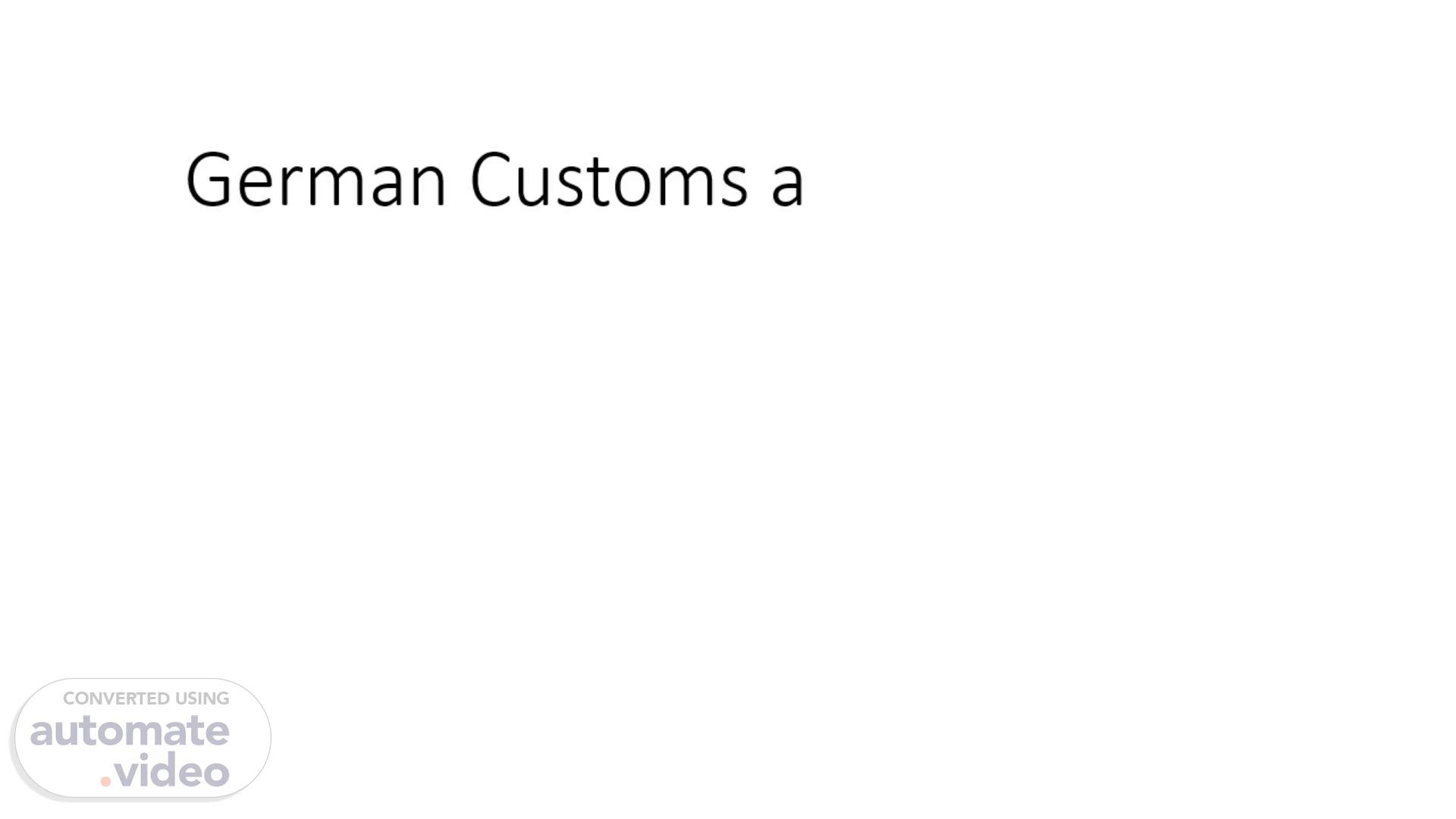Scene 1 (0s)
German Customs and Traditions.
Scene 2 (6s)
Title Slide: Welcome to German Culture Title: German Customs and Traditions: A Glimpse into Gemütlichkeit Subtitle: Exploring the Rich Heritage and Everyday Life of Germany Image/Design: A collage or single image featuring iconic German elements (e.g., Neuschwanstein Castle, a pretzel, people celebrating Oktoberfest)..
Scene 3 (22s)
Introduction: The Heart of German Kultur. Main Point: German culture is a blend of tradition, punctuality, efficiency, and a deep appreciation for community and nature. Key Facts: Germany is a federal parliamentary republic in Central Europe. Cultural differences exist between regions (e.g., Bavaria vs. Northern Germany). The concept of Gemütlichkeit (coziness, comfort, and good cheer) is central to social life. Briefly: Set the stage for exploring a well-ordered yet warm culture.
Scene 4 (44s)
The Importance of Food & Drink. Main Point: German cuisine is hearty, diverse, and a major part of social gatherings. Beer Culture: Purity Law (Reinheitsgebot): Defines the strict rules for brewing. Beer Gardens (Biergärten): Essential social meeting places, especially in Bavaria. Prost! (Cheers!) Staple Foods: Bread (Brot): Over 300 types; a staple of every meal. Sausages (Wurst): The variety is immense (e.g., Bratwurst, Currywurst). Potatoes (Kartoffeln): Used in countless ways..
Scene 5 (1m 8s)
Major Annual Celebrations. Main Point: Festivals mark the changing seasons and important historical/religious dates. Oktoberfest: World's largest folk festival held in Munich (starts late September). Features beer, traditional food, and fairground rides. Carnival (Karneval/Fasching): Known for parades, costumes, and parties, especially in cities like Cologne and Düsseldorf. Begins on November 11th and peaks before Ash Wednesday. Christmas Markets (Weihnachtsmärkte): Magical pre-Christmas tradition with crafts, Glühwein (mulled wine), and festive food..
Scene 6 (1m 32s)
Christmas and Advent Traditions. Main Point: The Christmas season is rich with deeply rooted, cozy traditions. Advent (Adventszeit): The four weeks leading up to Christmas Day. Advent Wreath (Adventskranz): Four candles lit, one for each Sunday. Advent Calendar (Adventskalender): 24 small doors to open daily. St. Nicholas Day (Nikolaustag - Dec 6th): Children leave out their cleaned boots (Stiefel); St. Nicholas fills them with small gifts and treats. Christmas Eve (Heiligabend - Dec 24th): The main day of celebration, gift-giving, and family dinner..
Scene 7 (1m 57s)
Etiquette and Social Norms. Main Point: Punctuality, order, and respect for privacy are highly valued. Punctuality: Always be on time for appointments, business meetings, and social engagements. Being late is considered disrespectful. Greeting: A firm handshake is standard for greetings and farewells. Use titles (Herr/Frau Doctor/Professor) in formal settings. Formal vs. Informal: Start with the formal address (Sie) and wait for the German person to invite you to use the informal (du). Recycling (Mülltrennung): Germans are very dedicated to sorting trash into different color-coded bins..
Scene 8 (2m 24s)
Home and Living (Wohnkultur). Main Point: German homes emphasize quality, cleanliness, and functional design. Privacy: Germans value their personal space and privacy. Don't show up unannounced (always call ahead). Shoes Off: It's common practice to take your shoes off immediately upon entering a home. Sunday Rest (Sonntagsruhe): Sundays are strictly for rest. Most stores are closed, and noisy activities (like mowing the lawn) are generally avoided. It's a day for family, nature, and relaxation..
Scene 9 (2m 47s)
Leisure and Hobbies. Main Point: Germans enjoy an active lifestyle with a focus on nature, sport, and culture. Clubs (Vereine): A significant part of social life. Germans join clubs for everything (sports, gardening, singing, etc.). Hiking and Cycling: A national passion; Germany has an extensive network of trails and paths. DIY (Heimwerken): There's a strong culture of home improvement and self-reliance. Culture: High attendance at theaters, museums, and concerts is common..
Scene 10 (3m 10s)
Language Insights and Idioms. Main Point: The German language reflects some of the culture's values. Feierabend (literally "celebration evening"): The end of the workday and time to relax. It’s a beloved concept. Schadenfreude (joy in another's misfortune): A famous German compound noun, illustrating precision in language. Ordnung muss sein (Order must be): A common phrase reinforcing the importance of structure and organization. Praise for Structure: Many German compound words reflect a love for combining ideas and creating specific terms..
Scene 11 (3m 33s)
Conclusion: Embracing German Culture. Summary: German culture is defined by a blend of tradition, efficiency, a warm social life (especially around food and drink), and a strong respect for order and nature. Key Takeaway: Understanding the concepts of Gemütlichkeit, Feierabend, and punctuality is key to appreciating German life..
